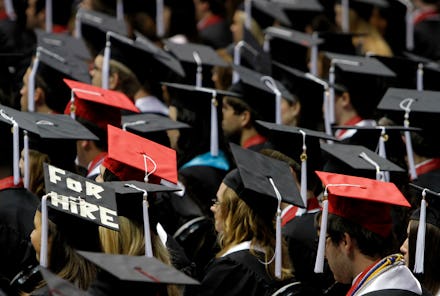The Obama Administration Finally Has An Answer to Student Debt — And Colleges Hate It

The news: Colleges are not very happy with the Obama administration's new plan to introduce a federal rating system to the nation's secondary education system. And they're even less happy about the idea of education being rated like, as Education Department Deputy Under Secretary Jamienne Studley put it, "a blender."
The Obama administration believes the rating system will be a viable solution to alert students to underperforming schools that are sucking up more and more of the public's money. And it has the end goal of making college more affordable for students, as well as funneling them into programs that provide a better value for the dollar.
Colleges and universities soak in about $150 billion annually in federal loans and grants, but those schools are widely viewed as overpriced and more concerned with pedigree and image than providing solid educations. The ratings system would take into account factors like debt levels and graduation rate, as well as employment after graduation, all to give students more information to make good choices of an alma mater.
College presidents aren't happy about this disruption to academia. From the New York Times:
Many college presidents said a rating system like the one being considered at the White House would elevate financial concerns above academic ones and would punish schools with liberal arts programs and large numbers of students who major in programs like theater arts, social work or education, disciplines that do not typically lead to lucrative jobs.They also predicted that institutions that serve minority and low-income students, many of whom come from underfunded schools and have had less college preparation, would rank lowest in a new rating system, hurting the very populations the president says he wants to help.
The background: The ratings system won't be rolled out until at least the fall, but eventually, Obama would like Congress to agree to tie financial aid to ratings by 2018. The ratings system will not be a ranking, meaning top-tier colleges will be listed right alongside high-performing regular schools.
While the criticism from university presidents is major, advocates point out that information imbalance is used to colleges' advantage when choosing colleges. The 85% of students who attend less-selective institutions are disproportionately vulnerable, and the college they choose will have a major impact on their future. A ratings system could help them choose colleges they are likelier to graduate from, will cost less money and provide better work experience and connections.
Tuition is skyrocketing across the country, especially relative to low levels of income. This chart illustrates the number of hours an undergrad at Michigan State University would have to work at the minimum wage to pay off a single credit hours. It's risen from under 10 in 1980 to over 60 today.
College presidents and the like insist that the increase is tied to labor costs and declining state support. But a ratings system could direct prospects away from the institutions doing the worst job of educating students.
How will it affect me? Easy — college rankings would give you, your children and your friends and relatives more information when applying, including whether or not your institution gets graduates jobs or is competitively priced.
However, the real meat of the system would be congressional approval to tie loans to the ratings. If it works, it will help students pull through college and land jobs more easily. It could also help alert applicants to schools with advertising campaigns that are misleading or outright lies. If it's a mess, it could harm already-struggling schools, many of which serve minority students.